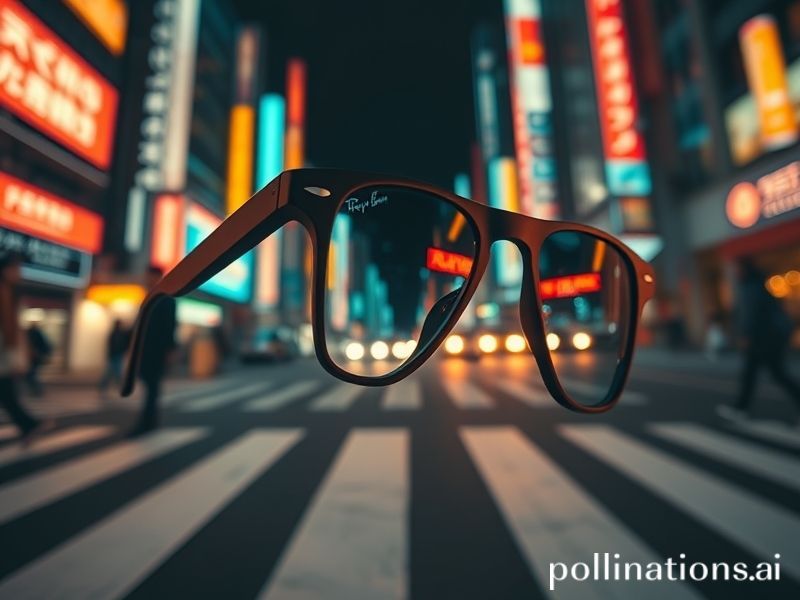Ray-Ban Meta Smart Glasses: How Italy’s Fashion Icon Became Humanity’s Favorite Surveillance Tool
**The New Panopticon: Ray-Ban Meta Smart Glasses and the Global Theater of the Absurd**
In a world where privacy has become as quaint as a rotary phone, Ray-Ban’s Meta smart glasses have arrived to ensure that no moment goes unrecorded, no indiscretion unarchived, and no dinner conversation undocumented by that guy at the next table who keeps touching his temple suspiciously. The collaboration between the Italian eyewear giant and Meta’s data-hungry algorithms represents humanity’s latest leap into voluntary surveillance—a global phenomenon that would make Orwell spit out his tea.
From the bustling cafés of Paris to the humid street markets of Bangkok, these $299 face computers are transforming ordinary humans into walking CCTV stations, each equipped with a 12-megapixel camera and the ability to livestream directly to Facebook and Instagram. Because nothing says “living in the moment” quite like broadcasting it to millions of strangers while looking like a tech bro who lost a bet.
The international implications are as vast as they are troubling. In nations where government surveillance already operates with the subtlety of a sledgehammer—China’s 200 million cameras, Russia’s facial recognition systems, the UK’s generous helping of one camera per 11 people—these consumer surveillance devices add another layer to our increasingly watched existence. It’s as if we’ve collectively decided that if we’re going to live in a panopticon, we might as well make it fashionable.
European regulators, those perennial party poopers of the tech world, have already raised concerns about data protection. Germany’s privacy advocates have practically developed a nervous twitch, while France’s CNIL has been making noises that roughly translate to “non, merci” in their charmingly bureaucratic way. Meanwhile, in the United States, where privacy concerns are typically met with a shrug and a request to sign away your rights in 8-point font, the glasses have been embraced with the enthusiasm of a toddler discovering a new way to make noise.
The global south presents its own tragicomic theater. In countries where basic infrastructure remains a luxury, watching tourists document their “authentic experiences” through $300 surveillance spectacles adds insult to injury. Nothing quite captures the spirit of neo-colonialism like livestreaming someone’s daily struggle for survival in 1080p HD.
What makes this particularly rich is humanity’s eagerness to participate in its own surveillance. We’ve moved beyond the classic dystopian narrative where governments force monitoring upon unwilling citizens. Instead, we’re paying corporations for the privilege of becoming their data collection nodes, all while looking like we’re auditioning for a reboot of “The Matrix” directed by someone with a nostalgia problem.
The cultural variations in acceptance are fascinating. Japanese society, with its complex relationship between privacy and public space, has embraced the technology with characteristic politeness—though one suspects the real test will come when someone livestreams a nomikai (drinking party) without permission. In contrast, Scandinavian countries, where personal space is measured in kilometers, view the glasses with the same enthusiasm they’d reserve for a stranger sitting in their lap on an empty bus.
As these devices proliferate across continents, we’re witnessing the birth of a new social contract: the right to record outweighs the right to remain unrecorded. The implications stretch from the mundane (goodbye, bad hair days in public) to the profound (hello, political dissidents being tracked through crowdsourced surveillance footage).
In the end, perhaps the greatest irony is that in our quest to document every moment, we’re missing the bigger picture: we’ve become both the watchers and the watched, volunteering for a surveillance state that no authoritarian regime could have imagined in their wildest, most optimistic dreams. The revolution won’t just be televised—it’ll be livestreamed, archived, and monetized, all through your designer eyewear.
Welcome to the future. Please face the camera and try to look natural.







